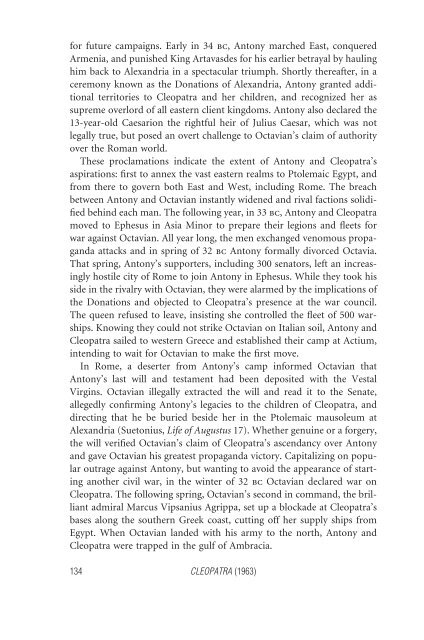Big Screen Rome - Amazon Web Services
Big Screen Rome - Amazon Web Services
Big Screen Rome - Amazon Web Services
Create successful ePaper yourself
Turn your PDF publications into a flip-book with our unique Google optimized e-Paper software.
for future campaigns. Early in 34 bc, Antony marched East, conquered<br />
Armenia, and punished King Artavasdes for his earlier betrayal by hauling<br />
him back to Alexandria in a spectacular triumph. Shortly thereafter, in a<br />
ceremony known as the Donations of Alexandria, Antony granted additional<br />
territories to Cleopatra and her children, and recognized her as<br />
supreme overlord of all eastern client kingdoms. Antony also declared the<br />
13-year-old Caesarion the rightful heir of Julius Caesar, which was not<br />
legally true, but posed an overt challenge to Octavian’s claim of authority<br />
over the Roman world.<br />
These proclamations indicate the extent of Antony and Cleopatra’s<br />
aspirations: first to annex the vast eastern realms to Ptolemaic Egypt, and<br />
from there to govern both East and West, including <strong>Rome</strong>. The breach<br />
between Antony and Octavian instantly widened and rival factions solidified<br />
behind each man. The following year, in 33 bc, Antony and Cleopatra<br />
moved to Ephesus in Asia Minor to prepare their legions and fleets for<br />
war against Octavian. All year long, the men exchanged venomous propaganda<br />
attacks and in spring of 32 bc Antony formally divorced Octavia.<br />
That spring, Antony’s supporters, including 300 senators, left an increasingly<br />
hostile city of <strong>Rome</strong> to join Antony in Ephesus. While they took his<br />
side in the rivalry with Octavian, they were alarmed by the implications of<br />
the Donations and objected to Cleopatra’s presence at the war council.<br />
The queen refused to leave, insisting she controlled the fleet of 500 warships.<br />
Knowing they could not strike Octavian on Italian soil, Antony and<br />
Cleopatra sailed to western Greece and established their camp at Actium,<br />
intending to wait for Octavian to make the first move.<br />
In <strong>Rome</strong>, a deserter from Antony’s camp informed Octavian that<br />
Antony’s last will and testament had been deposited with the Vestal<br />
Virgins. Octavian illegally extracted the will and read it to the Senate,<br />
allegedly confirming Antony’s legacies to the children of Cleopatra, and<br />
directing that he be buried beside her in the Ptolemaic mausoleum at<br />
Alexandria (Suetonius, Life of Augustus 17). Whether genuine or a forgery,<br />
the will verified Octavian’s claim of Cleopatra’s ascendancy over Antony<br />
and gave Octavian his greatest propaganda victory. Capitalizing on popular<br />
outrage against Antony, but wanting to avoid the appearance of starting<br />
another civil war, in the winter of 32 bc Octavian declared war on<br />
Cleopatra. The following spring, Octavian’s second in command, the brilliant<br />
admiral Marcus Vipsanius Agrippa, set up a blockade at Cleopatra’s<br />
bases along the southern Greek coast, cutting off her supply ships from<br />
Egypt. When Octavian landed with his army to the north, Antony and<br />
Cleopatra were trapped in the gulf of Ambracia.<br />
134 CLEOPATRA (1963)



